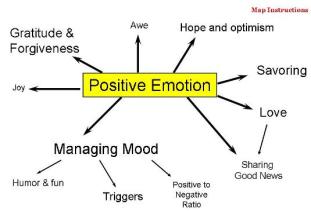
Did you know that motivation was linked to positive thinking? That you can motivate yourself simply by improving how you think in a non-negative way?
If you want to do something, you typically think about it first. But what gets you really working is how you feel about it. You can actually improve how you feel and the effectiveness of how well you perform simply by improving how you think. I know it seems like circular thinking, but stay with me here.
If you think you can do something you inspire performance enhancing emotions to act upon. Emotions like joy, optimism, excitement, enthusiasm, and gratitude. Emotions like these actually improve your chances of accomplishing what you want.
And the opposite stands true as well. If you think you can’t do something – or you just constantly complain about something – then you inspire performance inhibiting emotions. These emotions present themselves as fear, worry, envy, doubt, and anger. As you can imagine, these are the types of emotions that can decrease your motivation and performance outcomes.
You know, as well as I do, that life often times gets in the way of what we want to accomplish. Because our life circumstances are never optimal, we have to learn to think positively in order to maintain motivation and good performance despite whatever circumstances we are experiencing. Focusing on positive thinking regardless of what we are experiencing reinforces those emotions, like joy, optimism, and gratitude, which reinforce our chances of staying motivated toward our goals.
This is how it works. Circumstances are random and meaningless until we assign them a meaning and an emotion. Since we assign the meaning, we are responsible for how we feel, what we do, and how others react to us. This means we have the power to control how we respond to any circumstance. Isn’t that a freeing thought? We have control over our response so therefore we have freedom from our circumstances!
One way to focus on the positive, is to harness the emotion of gratitude. Here are three steps to choosing to respond to challenging circumstances with gratitude.
1. Start each day with gratitude.
This can be done either while you are still in bed, while you are eating breakfast, or when you start your work day, but start each day with gratitude. I always recommend you write four or five things down that you are grateful for each morning. However, if you hate writing and the suggestion that these be written will keep you from doing this step, then skip the writing piece and just state your four or five items out loud. These items do not have to be deep and philosophical. It is not a competition. And sometimes I find that finding gratitude in the littlest and most common of things actually increases the intensity of the emotion.
2. End each day with gratitude.
I find that ending my day with gratitude is often times easier than starting my day with gratitude because the opportunities from the day to be grateful are more top of mind. However, sometimes it can be challenging to find gratitude, especially if you had a crummy day. For instance, it may be hard to find the opportunity to be grateful when sitting in a traffic jam. But maybe that traffic jam was just the amount of time you needed to sort through a difficult client issue you’ve been dealing with. Maybe it gave you the alone time you need before you get home to a chaotic household. But, finding gratitude in the tough circumstances is the most rewarding and can completely shift your mindset in an instance.
3. Share gratitude with others.
Don’t just keep your gratitude to yourself. Share it with others. There is something magical about talking about what you are grateful for. Not only does it solidify it in your life, but it impacts those around you by encouraging them to view their life with more gratitude. I will challenge you to do this daily, especially with your children. There is something so rewarding to see them start to recognize the bright side of things. I see it with my daughter all of the time. She’ll start to complain about the amount of homework she has and then she’ll stop and say, “well, at least I get to go to school. A lot of kids don’t.” Or she’ll have a rough volleyball tournament and she’ll say, “that sucked. But at least I get to play and I get to play with teammates that I really enjoy hanging out with.” Gratitude is contagious.
Focusing on gratitude allows you to control your thoughts to produce performance enhancing and motivating emotions. It puts you in control of your own self-motivation to perform and creates a resilience to persevere despite circumstances that can be negative or discouraging. As an end result, you have the freedom to create any emotion you prefer to act upon, regardless of your external circumstances keeping you motivated and performing at your highest level.
